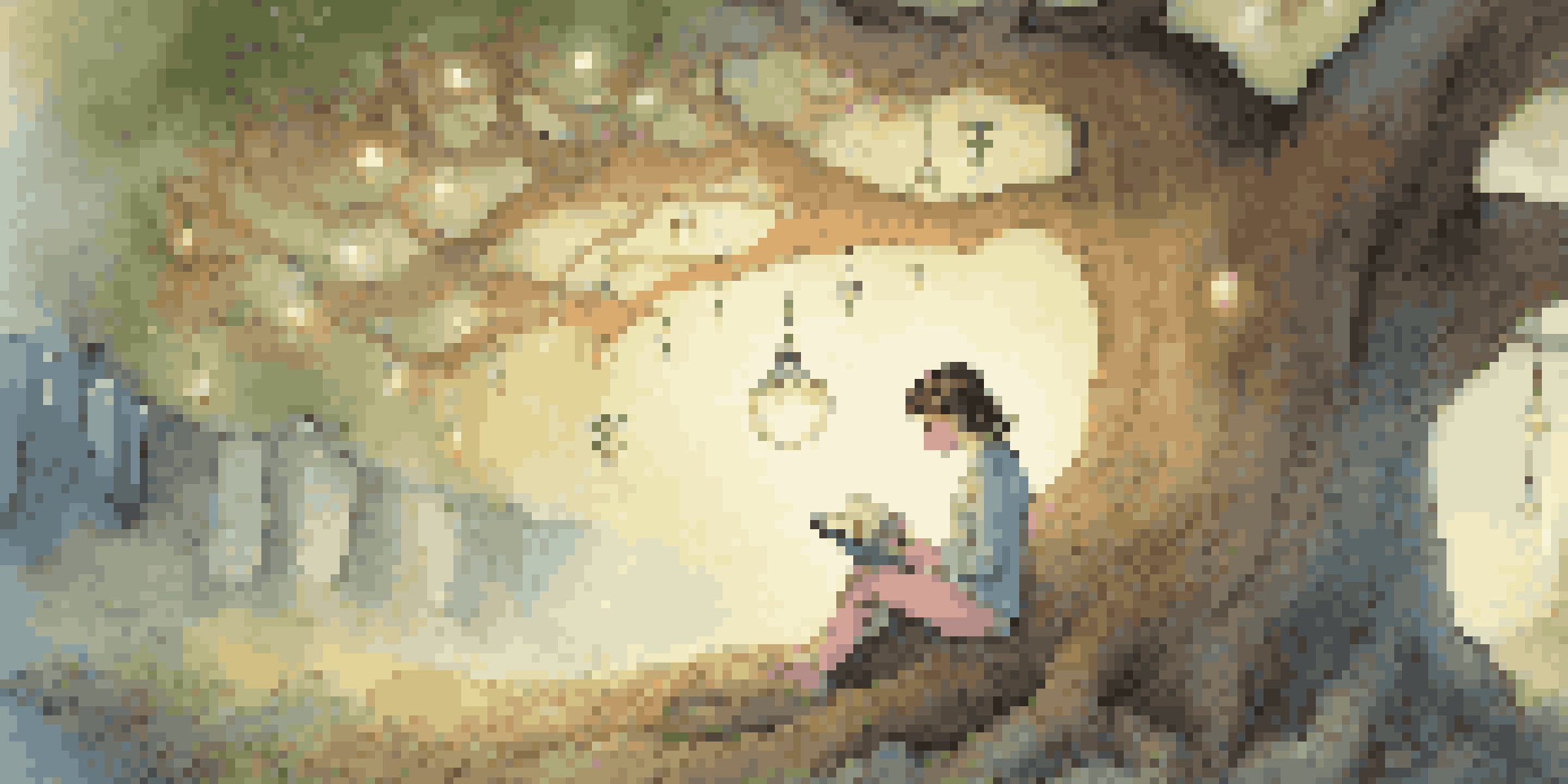The Role of Fiction in Exploring Identity and Belonging

Fiction as a Mirror of Identity
Fiction often serves as a mirror, reflecting our own identities back to us. When we read stories, we find characters who experience struggles or triumphs that resonate with our own lives. This connection allows us to explore our identities in a safe space, leading to greater self-awareness and understanding.
We read to understand ourselves and to understand others.
For instance, a young adult novel featuring a protagonist grappling with cultural heritage can prompt readers to reflect on their own backgrounds. By seeing themselves in these characters, readers might question what identity means to them personally. This journey of self-exploration is a vital part of growing up and finding one's place in the world.
Moreover, fiction opens up discussions about identity that might be uncomfortable in real life. Through narrative, readers can confront complex themes such as race, gender, and sexuality, and how these factors shape who we are. This process not only fosters empathy but also encourages readers to embrace their unique identities.
Belonging Through Shared Stories
Stories have a unique ability to create a sense of belonging among readers. When we dive into a fictional world, we often find communities that reflect our own experiences or values. This shared narrative can foster a sense of connection, making us feel less alone in our journeys.

For example, a fantasy novel depicting a group of misfits who band together highlights the importance of friendship and loyalty. Readers may identify with the feeling of being an outsider, yet find solace in the idea that they can still form meaningful relationships. Such stories remind us that belonging can be found in the most unexpected places.
Fiction Reflects Our Identities
Through relatable characters and narratives, fiction allows readers to explore their own identities and experiences.
Additionally, fiction encourages readers to connect with others who share similar interests. Book clubs and online forums often sprout from a shared love of a particular story, creating communities that celebrate diversity and inclusion. These interactions not only enhance our reading experience but also solidify our sense of belonging in a larger narrative.
Exploring Cultural Identity in Literature
Cultural identity is a rich theme explored in many works of fiction. Authors often weave their cultural backgrounds into their narratives, allowing readers to gain insights into different ways of life. This exploration can broaden our understanding of various cultures and foster appreciation for their uniqueness.
Fiction is the lie through which we tell the truth.
For instance, novels that delve into immigrant experiences can illuminate the challenges and triumphs of navigating two cultures. Readers from similar backgrounds may feel validated in their experiences, while others can learn about the complexities of cultural identity. This exchange of perspectives is vital in our increasingly globalized world.
Furthermore, literature often challenges stereotypes and misconceptions about cultures. By presenting multifaceted characters and stories, fiction can break down barriers and promote a deeper understanding of diverse identities. This not only enriches our reading experience but also cultivates empathy for those whose experiences differ from our own.
The Role of Fiction in Self-Discovery
Fiction can be a powerful tool for self-discovery, allowing readers to explore facets of their identities they may not have considered. Through the journeys of characters, we often find reflections of our own hopes, fears, and aspirations. This process can lead to a deeper understanding of who we are and what we value.
For instance, a coming-of-age story may resonate with readers navigating their own transitions into adulthood. As characters grapple with issues of self-acceptance and purpose, readers might find encouragement to confront their own struggles. This shared journey can be both enlightening and empowering.
Stories Foster a Sense of Belonging
Shared narratives in fiction create communities among readers, reinforcing connections and a sense of belonging.
Moreover, the act of reading fiction can inspire readers to ask profound questions about their own lives. This introspection can lead to meaningful changes or a renewed sense of purpose. Ultimately, fiction acts as a catalyst for personal growth, guiding us on our paths to self-discovery.
The Healing Power of Storytelling
Storytelling has long been recognized for its therapeutic benefits, particularly in addressing issues of identity and belonging. Many individuals turn to fiction to process their feelings and experiences, finding solace in narratives that resonate with their struggles. This healing aspect of storytelling can be transformative.
For example, a memoir written by a trauma survivor can provide validation and understanding to readers facing similar challenges. As they read about someone else’s journey, they may feel less isolated and more empowered to confront their own issues. This shared experience fosters a sense of community and support.
Additionally, engaging with fiction can serve as a form of escapism, allowing readers to temporarily step away from their realities. This break can provide much-needed relief and clarity, enabling individuals to return to their lives with a fresh perspective. Ultimately, the healing power of storytelling reinforces the importance of narratives in our lives.
Fiction's Role in Challenging Norms
Fiction often serves as a platform to challenge societal norms and question the status quo. Authors utilize their narratives to address issues such as inequality, discrimination, and cultural expectations, prompting readers to reconsider their beliefs and assumptions. This critical engagement can lead to significant shifts in understanding identity and belonging.
For instance, novels that feature LGBTQ+ characters can challenge traditional notions of gender and sexuality. By presenting diverse experiences, these stories encourage readers to embrace a broader view of identity. This exploration can empower individuals to express their true selves without fear of judgment.
Fiction Challenges Societal Norms
By addressing issues like inequality and discrimination, fiction encourages readers to rethink their beliefs about identity.
Moreover, fiction can inspire activism and social change by raising awareness of pressing issues. Readers who are moved by a story may feel compelled to take action, whether through advocacy or simply by sharing their newfound insights. In this way, fiction plays a vital role in shaping our understanding of identity and fostering a sense of belonging in a diverse world.
The Future of Fiction and Identity Exploration
As society continues to evolve, so too will the role of fiction in exploring identity and belonging. With the rise of diverse voices in literature, readers can expect to encounter an even broader range of experiences and perspectives. This diversity is essential in nurturing a greater understanding of the complexities of identity.
Moreover, advancements in technology are changing how we engage with stories. Digital platforms offer new opportunities for storytelling, allowing for interactive narratives that can enhance our exploration of identity. These innovations promise to create richer, more immersive experiences for readers.

Ultimately, the future of fiction lies in its ability to reflect and adapt to the ever-changing landscape of human experience. As we continue to seek connection and understanding through stories, fiction will remain a vital tool for exploring our identities and fostering a sense of belonging in an interconnected world.